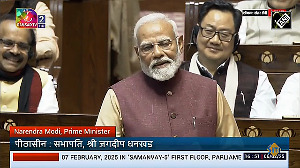With Australia remaining non-committal on supplying uranium to India, China on Monday said Canberra has done a "good job" in observing the obligations under the Nuclear Non-Proliferation Treaty.
"With regard to Australia's cooperation with India, I believe that Australia has done a good job in observing the obligations of non-proliferation in the international community," a senior Chinese diplomat told reporters at a briefing on Chinese Premier Wen Jiabao's April 1 to 4 visit to Australia.
China is set to sign a landmark uranium deal with Australia next week.
"We have also taken note that Australia has said that it is going to observe the obligations under the non-proliferation treaty," Director-General of the North American and Oceanian Affairs of the Chinese Foreign Ministry, Liu Jieyi said.
His comments came days after China, a member of the Nuclear Suppliers Group reportedly raised critical questions about the historic Indo-US civilian nuclear agreement in violation of the NPT as well as NSG regulations.
Australia had previously refused to sell uranium to India unless New Delhi signs the NPT.
But Australian Prime Minister John Howard, who has been recently briefed by US President George W Bush on the US-India civilian nuclear agreement, has recently indicated that he could reconsider Canberra's position.
Australia is also slated to send officials to New Delhi and Washington to find out more about the Indo-US nuclear agreement.
China and Australia are working on two agreements -- one on peaceful uses of nuclear power and one on uranium mining.
"Indeed, we have had substantive progress so far. Two documents have been prepared. We already have the draft texts. During Premier Wen's visit, it is likely that the two documents will be signed," Liu, who was earlier China's top arms control and disarmament official, said.
"The uranium issue will be raised during the talks because this issue is an important impetus for the mutually beneficial cooperation between the two countries," he said while reeling out the benefits that would accrue to both sides.
He emphasised that the possible Sino-Australian uranium deal would be limited to "peaceful use" of nuclear energy and it would also be subject to safeguards by the International Atomic Energy Agency, the UN's nuclear watchdog.
"This cooperation will benefit both China and Australia. It is also a cooperation that is good for the whole world because China is going out to build a society that is conservation-minded and environment-friendly," he said.
"This (agreement) is going to be good for the international community and therefore cooperation between China and Australia in uranium is one of the perspectives for the overall strategy of China," Liu said.
Australia holds some 40 per cent of the world's known reserves of uranium.






 © 2025
© 2025